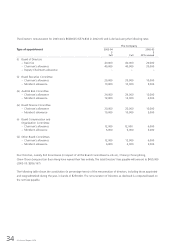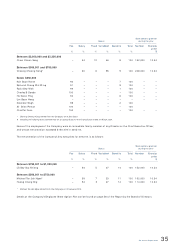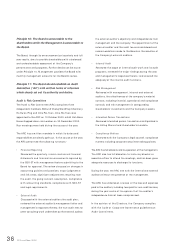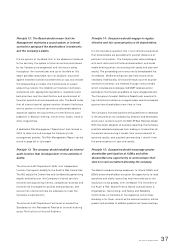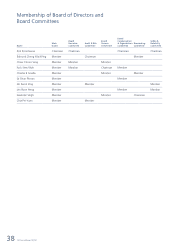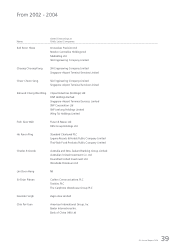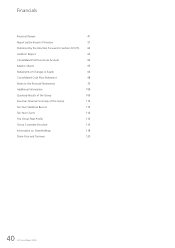Singapore Airlines 2004 Annual Report Download - page 34
Download and view the complete annual report
Please find page 34 of the 2004 Singapore Airlines annual report below. You can navigate through the pages in the report by either clicking on the pages listed below, or by using the keyword search tool below to find specific information within the annual report.32 SIA Annual Report 03/04
Principle 3: There should be a clear division of
responsibilities at the top of the company – the w orking
of the Board and the executive responsibility of the
company’s business – w hich w ill ensure a balance of
pow er and authority, such that no one individual
represents a considerable concentration of pow er.
The Chairman, Koh Boon Hwee and Chief Executive Officer,
Chew Choon Seng are not related to each other. The functions
of the Chairman and CEO are distinct and separate. The
Chairman is responsible for leading the Board in its strategic
direction of the Company, and ensuring that Board M eetings
are held regularly. The CEO is charged with leading
Management and the Company in achieving Company targets
and making operational decisions accordingly.
With the Chairman’s approval, Management prepares the
detailed agenda of each Board meeting. Board Papers contain
both regular items such as reports on its subsidiaries and
associated companies, updates on business development,
monthly management accounts, and productivity and
performance indicators, as well as matters for the decision
or information of the Board.
Principle 4: There should be a formal and transparent
process for the appointment of new directors to the
Board. As a principle of good corporate governance,
all directors should be required to submit themselves
for re-nomination and re-election at regular intervals.
Nominating Committee (NC)
The NC comprises three independent directors, namely, Davinder
Singh (Chairman), Edmund Cheng and Charles B Goode.
The NC’s role includes considering and making
recommendations to the Board relating to the appointment
and re-appointment of directors, and determining directors’
independence. The NC also considers candidates to fill new
positions created by expansion and vacancies that occur by
resignation, retirement or for any other reason.
The Company’s Articles of Association provide that one-third
of the Directors for the time being, or, if their number is not
three or a multiple of three, then the number nearest to but
not less than one-third are required to retire from office.
Retiring Directors are selected on the basis of those who have
been longest in office since their last election, failing which
they shall be selected by agreement or by lot. All re-elections
require the approval of the special member, the Minister for
Finance (Incorporated).
New Directors are appointed by way of Board Resolution,
following which they are subject to election by shareholders
at the next Annual General Meeting.
Principle 5: There should be a formal assessment of the
effectiveness of the Board as a w hole and the
contribution by each director to the effectiveness of
the Board.
The Company has implemented a process to assess the
performance of the Board as a whole. The Directors
independently evaluate the Board on selected criteria, of which
findings are then reviewed to identify areas for improvement.
The Board is still considering using the findings to monitor
the performance of individual directors.
Principle 6: In order to fulfil their responsibilities, Board
M embers should be provided w ith complete, adequate
and timely information prior to Board M eetings and on
an on-going basis.
The Board is provided with Board Papers well in advance
before each Board Meeting, to enable them to be properly
informed of matters to be discussed and/or approved. Directors
have separate and independent access to senior management
at all times. Directors can seek independent professional advice
if required and in accordance with procedure. Such costs will
be borne by the Company.














